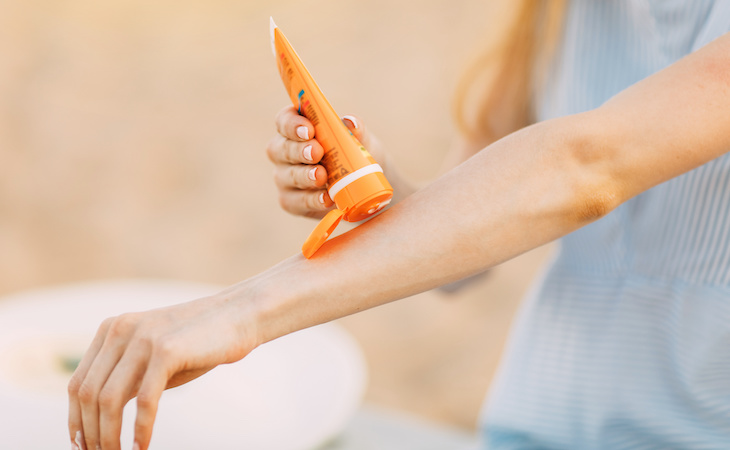Summertime often equates to fun in the sun! However, sun exposure during these warmer months can put people at risk for sunburns, a common occurrence even with preventive measures like applying sunscreen, wearing sun-protective clothing, and seeking shade during the middle of the day when the sun is strongest. [3]
If you’ve ever had a sunburn, you know just how uncomfortable the recovery process can be. Turns out sunburns can also make it hard to get a good night’s sleep. This article will discuss ways to soothe sunburn irritation and how to sleep with a bad sunburn.
What happens when you get sunburned?
While many enjoy the sunny and warm weather during the summer, the summer sun is not completely benign. The sun gives off UV radiation that harms the body by damaging the DNA in the upper layers of your skin, namely the dermis and the epidermis. [4]
This direct damage to the skin’s DNA sets off an inflammatory cascade that’s then felt symptomatically as a sunburn. [5] Sunburns, therefore, present on the skin with redness, pain, swelling, and itchiness—all characteristics of inflammation. Sunburns will also feel warm and tender to the touch. [1]
Most people develop sunburns as a result of a combination of inadequate skin protection along with excessive sun exposure. Symptoms of sunburn usually start about four hours after sun exposure, give or take. [6] Sunburns are worst, on average, for the first two to three days and generally resolve after three to five days. [6] People can also experience skin peeling about one week after the initial burn.
How do sunburns affect sleep?
Sunburns affect sleep because the inflammation—while necessary for healing—can leave you feeling pain and discomfort. Any significant pain can naturally make it more difficult to sleep. [7] If you have a bad sunburn on your back, for instance, it can be particularly challenging to get comfortable at night. However, even small sunburns can be bothersome.
How to sleep with a sunburn
Below are some tried and true tips that can help you sleep better with a bad sunburn and will keep you well-rested even during the worst phase of the recovery process.
However, you should always check with your own healthcare provider before using any medications—even over-the-counter—to ensure they’re safe for you. [2, 4]
- Avoid any further sun exposure until the burn heals.
- Make sure you drink plenty of water.
- Apply topical creams like aloe or hydrocortisone.
- Put a cool compress on the area of the burn before bed.
- Use a non-steroidal anti-inflammatory like ibuprofen to decrease pain and itching.
Most sunburns heal on their own without requiring further medical intervention. However, if you have a severely painful or blistering sunburn with any other symptoms like nausea, fever, or chills, you should seek immediate medical care. [1]
As a reminder, according to the Centers for Disease Control and Prevention, in order to stay safe in the sun, you should apply sunscreen with a sun protection factor, or “SPF,” of at least 15 about 30 minutes before any prolonged outdoor activity and reapply every two hours or sooner if needed with excessive sweating or water exposure. [1, 8]
Wear protective clothing like a wide-brimmed hat and sunglasses that block UV rays, and make sure you drink plenty of fluids. In addition, avoiding direct sun exposure between 10 am to 4 pm will also help prevent sunburns. [8]
FAQs
Can a sunburn get better overnight?
It depends. If you’re at least 24 to 36 hours into the healing process—so over the initial “hump” of the burn process—you’ll likely have an improvement in your sunburn overnight. [6] If you just recently developed the sunburn earlier that day or the day before, you may experience a slight worsening of your symptoms overnight as your body will likely still be in the acute phase of healing caused by the sun’s UV radiation. [4]
What can you do if you can’t sleep because of a sunburn?
If you’re having trouble sleeping with a sunburn, apply a moisturizing cream like aloe. Hydrocortisone cream can also help and is available over the counter. Additionally, oral painkillers may also soothe the burn. Make sure you have plenty of water by your bedside to avoid dehydration, and if needed you can also apply a cool compress or take a cool shower.
How do you sleep comfortably with a sunburn?
In order to sleep comfortably with a sunburn, make sure you wear loose and breathable clothing to bed that won’t irritate the burn further. Before bed, you can also apply a soothing cream like aloe or hydrocortisone and take a non-steroidal anti-inflammatory to decrease pain and itching. [1, 4, 6] If you can, it’s also a good idea to try and keep the room itself at an optimal, cool sleeping temperature anywhere from about 65 to 68 degrees Fahrenheit. [9, 10]
Have trouble sleeping in the summer? Check out our guide to the most common summer sleep problems and how to fix them.
References
- Mayo Clinic. Sunburn. https://www.mayoclinic.org/diseases-conditions/sunburn/symptoms-causes/syc-20355922
- American Academy of Dermatology Association. How to Treat Sunburn. https://www.aad.org/public/everyday-care/injured-skin/burns/treat-sunburn
- Holman, D. M., Ragan, K. R., Julian, A. K., & Perna, F. M. (2021). The Context of Sunburn Among U.S. Adults: Common Activities and Sun Protection Behaviors. American journal of preventive medicine, 60(5), e213–e220. https://doi.org/10.1016/j.amepre.2020.12.011
- Cleveland Clinic. Sunburn. https://my.clevelandclinic.org/health/diseases/21858-sunburn
- StatPearls. Sunburn. https://www.ncbi.nlm.nih.gov/books/NBK534837/
- Centers for Disease Control and Prevention (CDC). Sunburn. https://www.cdc.gov/niosh/topics/sunexposure/sunburn.html
- Mayo Clinic. Insomnia. https://www.mayoclinic.org/diseases-conditions/insomnia/symptoms-causes/syc-20355167
- CDC. Sun Safety Facts. https://www.cdc.gov/skin-cancer/sun-safety/?CDC_AAref_Val=https://www.cdc.gov/cancer/skin/basic_info/sun-safety.htm
- American Academy of Sleep Medicine. Healthy Sleep Habits. https://sleepeducation.org/healthy-sleep/healthy-sleep-habits/
- Sleep Foundation. Best Temperature for Sleep. https://www.sleepfoundation.org/bedroom-environment/best-temperature-for-sleep




